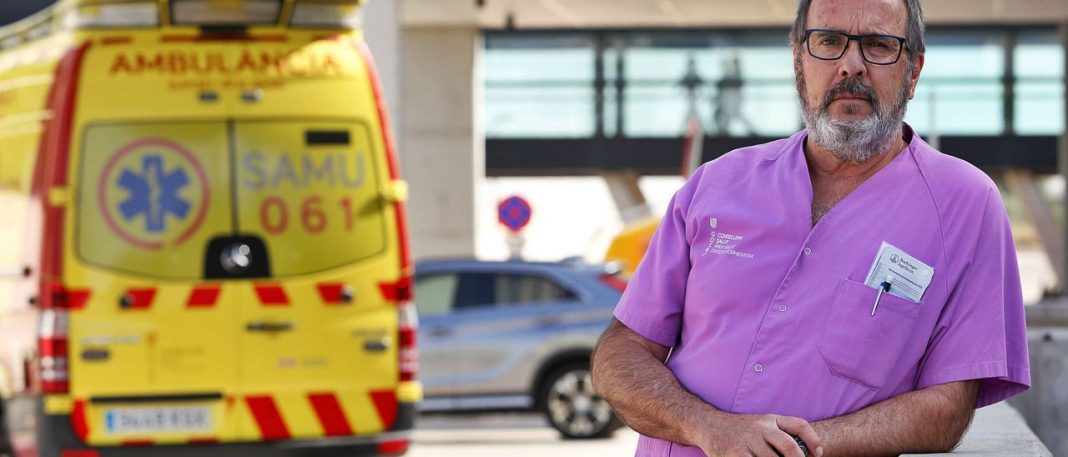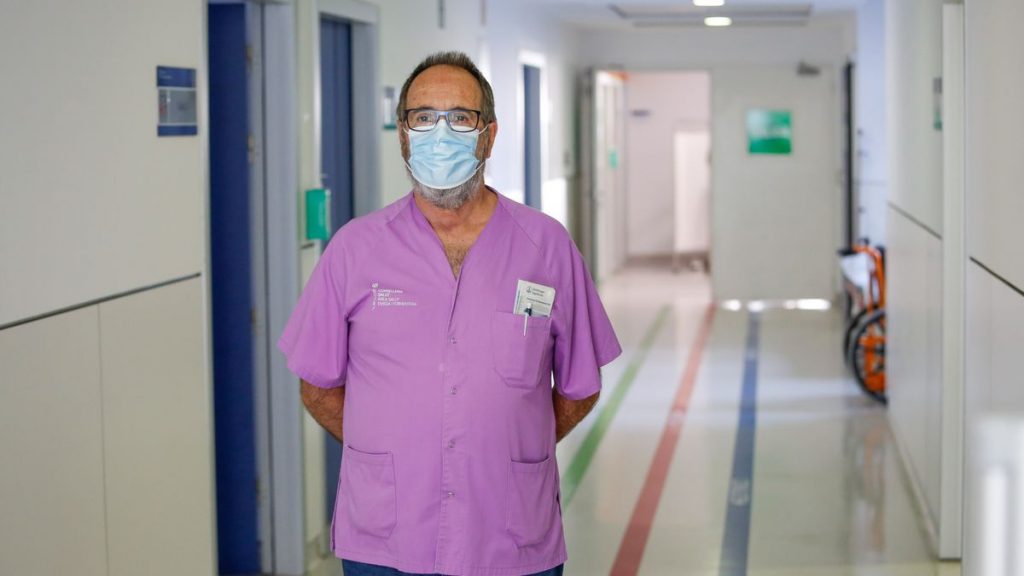Last year, the month of January saw the highest number of cases in Can Misses Hospital Emergency Department, in Ibiza. This was a rare occurrence due to the coronavirus pandemic, explains new head, Paco Muela. This year, although there is already a noticeable upturn in activity, service professionals are seeing an average of 120 cases a day, it is a far cry from the usual 180, says the doctor, who confesses that he would rather be seeing patients, which is what he really enjoys, rather than organising the department. He already held this position 18 years ago and had no plans to repeat the experience. “This is my department, this is my hospital and I care about what happens,” he explains.
It’s 10am on a Monday in June, what’s it like in the ER?
This summer is not like last summer. There is more activity and we continue to have the usual problems: shift coverage, lack of staff etc. We have been allocated additional support for the summer, but let’s see if we can get people to come and work. Between the island’s remoteness and rental prices, it is difficult for those who come to find an option that works for them. The pandemic has only exacerbated problems it’s not to blame for, such as a shortage of staff. There is a shortage of doctors.
Emergencies is a very compromised site. You work a lot, you have a full shift and it does not matter morning or afternoon or evening, we cannot regulate the flow, you attend to the patients as they come
Why don’t people want to be in the ER?
The ER is a very busy place. There’s a lot of work, you do a full shift and it doesn’t matter if it’s morning, afternoon or evening, we can’t regulate the flow, you see patients as they come in. At 5am, a doctor has been working for 23 hours. That’s very tiring and is not well compensated financially. In addition, in this mix of specialists who make up the department’s staff there are those who are dedicated emergency physicians and others for whom this is just a short phase in life. There is a strong nucleus of people working with us but we need to call on specialists from other areas. And we’re trying to recruit them from nowhere, but it is not just our problem, it is all over the Balearic Islands.
How much staff do you need?
In principle we have up to 30 doctors working and our core staff is 24. But of those 30 there are those with reduced working hours, adjustments due to illness, people who don’t do on-call and other personal situations. There are 30 of us in total, but if six have a reduced shift, those six are actually three. What we need first is for the pandemic to end, but that does not depend on hospital management or the Regional Ministry.
Paco Muela Vicent Marí
How has the pandemic affected this department?
It has revolutionised our way of working. Having to create two channels, one for covid and the one for the rest, completely disrupts everything, from the physical organisation, to the space, to the staff. It forces us to double up some positions when there is already serious understaffing. After Christmas the department faced a critical moment. We were on the verge of having problems.
You said that you were on the verge of not being able to take on more patients.
Yes. We would have come up with something because we can’t say that we are closed. We are the island’s hospital. It would have meant having patients in corridors and other repercussions that were already a struggle. The previous department was just hell and one of the things we set out to do, as a rule of thumb, was make sure there were no patients in the corridors.
At the beginning of the The pandemic attendance was significantly reduced, but we are gradually returning to normality
Many people believe that during the pandemic the ER has been empty.
No. At the outset of the pandemic, when we went into lockdown, there was a feeling of extreme caution, not to say panic, in the population and yes, April of last year was the calmest month I have experienced in my time working here. But not this year. People have been becoming more active and little by little we are seeing an increase in demand. We stopped seeing patients who did not need hospital emergencies, but also people who should have come: advanced heart attacks, appendicitis etc. At the beginning of the pandemic there was a significant reduction in care, but we are gradually returning to normality.
I do not know if that’s good or bad.
It is what it is, it is neither good nor bad. Here we attend to everything and, between our lack of personnel and the resumption of activity, there are times when the areas where minor pathologies are attended to see a build-up in patients. And that is very undesirable in a pandemic situation.
How have you dealt with family members? Normally they would wait outside, but that was not possible.
The protocol for informing relatives was changed. We asked them not to stay outside and that we would inform them by phone, for which both the infirmary and the administration collected contact numbers. But that’s not all….
…the relatives also watched the patient, right?
Exactly. We modified the cubicles in November to enable better control in the clinical area. What happened is that when we disrupted the architectural structure we had to modify the organisational structure. Suddenly we had two monitoring areas, two for paediatrics, a clean access from covid, double nursing and medical staff to cover two areas: the covid-free and the coronavirus area, which not only treats patients with the virus, but also those with other things. Covid doesn’t vaccinate you against anything. You break hips, you get heart attacks, strokes etc. A ministerial order forced us to divide the department into two areas. It had to be an almost watertight separation and that is practically impossible, especially given the physical structure of the service. The first thing that our department lacks is staff, and the second, space.
The covid does not vaccinate you AGAINST anything. You break hips, you get heart attacks, strokes ETC. A ministerial order forced us to divide the DEPARTMENT into two areas. It had to be an almost watertight separation and that is practically impossible
All ER Heads have criticised the space’s configuration. You too?
Yes, totally. There are areas that are neither functional nor ergonomic. Especially the external area, where we treat less serious pathologies. It is very poorly structured because you have to move through the consulting rooms.
Do you want a open space?
No, not all open-plan. We can’t mix children with adults. And we have different levels of care, so we have to have a separate area for critical patients, who have to be monitored more closely. We had a critical area that became the covid room and we split the non-critical area in two. Given the enormous fluctuation in the pressures on healthcare, we also had to divide the covid zone. This meant a total change in the way we have to work, in how we move etc. You learn what you can do and how. You need an organisatioal system that is flexible enough, elastic enough even, to be able to respond.
For the full article, please visit Diario de Ibiza website here.



